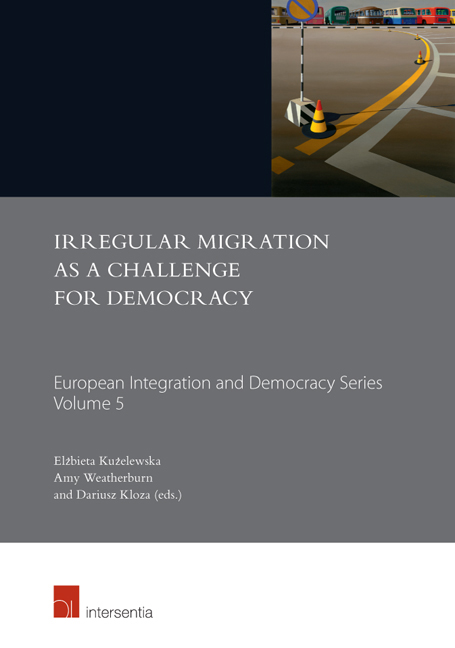Book contents
- Frontmatter
- Foreword
- Introduction
- Contents
- List of Abbreviations
- PART I The European Integration Project And Irregular Migration: Upholding Fundamental Values And Principles
- 1 The ‘Migrant Crisis’: Member States’ or EU's Responsibility?
- 2 Solidarity in EU Asylum and Migration Law: A Crisis Management Tool or a Structural Principle?
- 3 EU Foreign Policy and Other EU External Relations in Times of Crisis: Forcing the Law to Overlap?
- 4 The Migration Crisis in Europe: The Implications for Trade and Labour in a Globalised Context
- 5 Has the Migration Crisis Challenged the Concept of the Protection of the Human Rights of Migrants? The Case of Ilias and Ahmed v. Hungary (Invited Contribution)
- 6 European Responses to the Mediterranean ‘Refugee Crisis’ and the Fear of Saving Lives (Invited Contribution)
- Part II Migrants, their Rights and the Limits Thereof
- Part III The Status Quo of Migration in Europe: Selected National Perspectives
3 - EU Foreign Policy and Other EU External Relations in Times of Crisis: Forcing the Law to Overlap?
from PART I - The European Integration Project And Irregular Migration: Upholding Fundamental Values And Principles
Published online by Cambridge University Press: 12 October 2018
- Frontmatter
- Foreword
- Introduction
- Contents
- List of Abbreviations
- PART I The European Integration Project And Irregular Migration: Upholding Fundamental Values And Principles
- 1 The ‘Migrant Crisis’: Member States’ or EU's Responsibility?
- 2 Solidarity in EU Asylum and Migration Law: A Crisis Management Tool or a Structural Principle?
- 3 EU Foreign Policy and Other EU External Relations in Times of Crisis: Forcing the Law to Overlap?
- 4 The Migration Crisis in Europe: The Implications for Trade and Labour in a Globalised Context
- 5 Has the Migration Crisis Challenged the Concept of the Protection of the Human Rights of Migrants? The Case of Ilias and Ahmed v. Hungary (Invited Contribution)
- 6 European Responses to the Mediterranean ‘Refugee Crisis’ and the Fear of Saving Lives (Invited Contribution)
- Part II Migrants, their Rights and the Limits Thereof
- Part III The Status Quo of Migration in Europe: Selected National Perspectives
Summary
INTRODUCTION
The European Union (EU) imposes on itself its own constraints in which it performs as an external actor, and yet, there is little acknowledgment of this imposed constraint. It is the migration crisis, an unexpected occurrence, which happens to have brought the fields of EU external relation law and migration law together. The EU ’ s external border, on both land and sea, has brought vivid images of tightened borders through legal acts of non-traditional nature, namely, the resort to securitisation and militarisation. Challenges, such as mass irregular migration, require more than just the individual responses of a few selected Member States that are directly affected by the issue. With thousands of persons attempting to reach the shores of EU Member States, and the perils such persons face on their journey, which has seen mass drownings in the Mediterranean Sea, the EU and its Member States have not stood idly by. Instead, decisive action on a number of fronts has been imperative.
These responses to the migration crisis have been caught up in a multileveled legal architecture that, whilst complementary, can also compete with other interested stakeholders. Local responses, coupled with national efforts at Member State level and supranational coordination determination, make for a paradigm that is difficult to disentangle. The level of human smuggling and wider trafficking activity in the more troubled regions of the European neighbourhood pose new challenges that defy traditional convention. The profiteering from such unscrupulous activity poses a significant threat to the rule of law in the EU, and EU Member States more generally. Certain Member States, such as Greece and Italy, have been faced with a two-fold setback with the financial crisis along with being subjected to migration flows into the EU which, being on the EU ’ s geographic periphery, have been unprecedented. Accordingly, the likelihood is that the EU would do everything it possibly can to stem the flow of irregular migration from third states, to alleviate such problems.
Information
- Type
- Chapter
- Information
- Irregular Migration as a Challenge for Democracy , pp. 51 - 82Publisher: IntersentiaPrint publication year: 2018
Accessibility standard: Unknown
- 2
- Cited by
